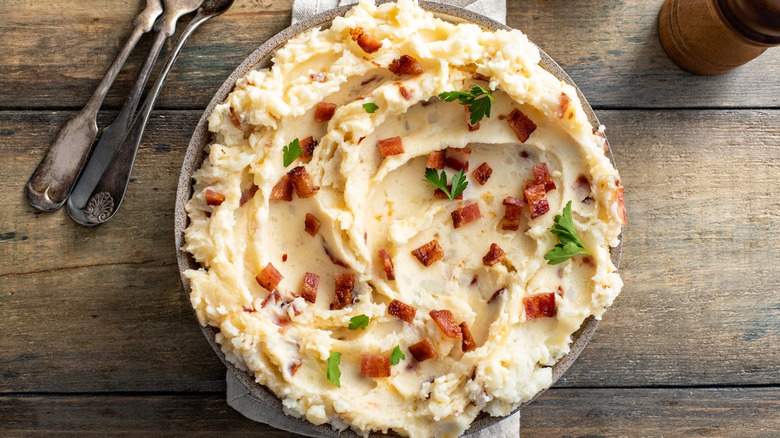Instant Flakes Are The Secret To Thickening Your Mashed Potatoes
Creamy and comforting, it's hard to deny the deliciousness of fluffy mashed potatoes. Luckily, they don't require more than a few ingredients to make — a few spuds and some dairy, at their simplest — nor do they require a complex preparation process. But, that's not to say that recipes can't fall by the wayside. After all, sometimes the most straightforward of recipes can be the hardest to master. However, all hope isn't lost when it comes to battling with consistency. If your mash is looking runny and thin, stirring in some instant potato flakes can be an easy fix.
Instant potato flakes are exactly what they sound like. Slender and papery shards, the flakes are made by dehydrating already-cooked and smashed taters. Given that you can easily whip up an entire batch of mashed potatoes after adding liquid to them, it shouldn't come as a surprise that the instant flakes can also be used to remedy a mash that's far too thin. Acting as an effective thickening agent, potato flakes are able to absorb some of the excess liquid and ensure that the mash transforms back into its wonderfully fluffy self.
At this point, you might be wondering, why instant potato flakes and not other thickeners? Well, unlike raw flour or chalky cornstarch that can have a negative impact on flavor, instant potatoes are a more seamless solution since they boast almost identical traits to mashed taters, which means flavors and textures won't be compromised.
Preventing watery potatoes (and how to fix them when things go awry)
Although mistakes do happen, it's best to avoid making runny potatoes in the first place. That means starting with the proper spuds and cooking them accordingly to prevent taters from becoming waterlogged. Likewise, always remember to fully drain potatoes once they're boiled. If an abundance of water is left in the sauce pot, there's a very likely chance you'll end up crafting a mash that's way too wet.
As for the mashing process itself, try not to overwork the spuds. Excessive smashing will only create more of a textural problem, causing potatoes to become gluey. Additionally, it's super important to drizzle in dairy (or broth) in small doses and combine it well before pouring in more. Doing this will help you to better gauge consistency and (hopefully) achieve silkier and smoother mashed potatoes that are anything but thin. Of course, should there be an issue, the instant potato flake hack can save the day.
If all else fails, simply stir the shards into the mash, sprinkling in a single spoonful at a time so that you don't run the risk of overcorrecting. It doesn't hurt to leave the spuds on the burner either since the extra heat can work to further rid spuds of any additional moisture. Just like that, a batch of mashed potatoes that you previously deemed unfixable can easily be fixed — that's a win in our books.

